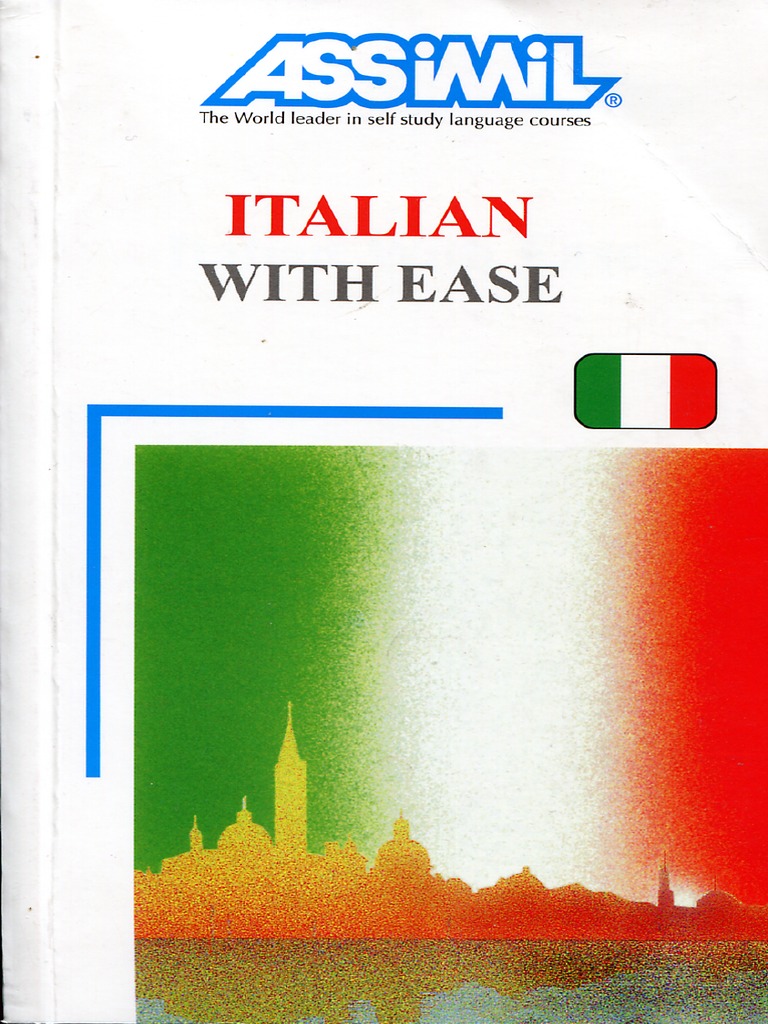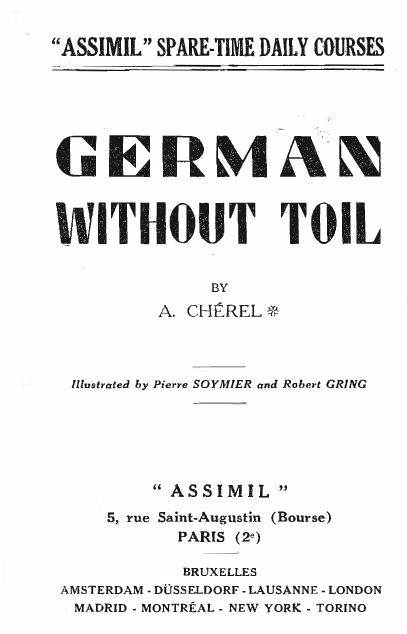- With Ease Perfect your skills Business Workbooks Target: Languages Assimil Dictionaries Phrasebooks Keep it casual Assimil English Assimemor Other titles Sing to learn MCQ Assimil Langues, etc. Kids & Teens - Detective's eye Kids & Teens - 100% english.
- Assimil German with Ease - Learn German for English Speakers - Book+4CD's (German Edition) by Collectif Apr 18, 2017. 4.6 out of 5 stars 17. Assimil German With Ease - Learn German for English speakers - Book+1CDmp3 (German Edition) by Assimil Language Courses May 17, 2011. 5.0 out of 5 stars 3.
- Assimil German With Ease Pdf English Translation
- Assimil German With Ease Pdf
- Assimil German With Ease Pdf English Version
- Assimil German With Ease
- Assimil German With Ease Pdf


PDF, 284.43 MB. New French with Ease With Workbook (Assimil Method Books) CD. Language: english. File: ZIP, 102.83 MB. Assimil - El Aleman. Assimil – Russian – 83 Lesson Delicious Digg reddit Facebook StumbleUpon. I have a copy of Assimil German without Toilincluding audio. Assimil – Russian – 39 Lesson Assimil – Russian – 57 Lesson toiil Here’s a quote from Wikipedia: Making the older versions in just as much a demand as the modern ones.
April 29, 2008 | History
86 works Add another?
Most Editions | First Published | Most Recent
Showing all works by author. Would you like to see only ebooks?
Assimil German With Ease Pdf English Translation
12345Next >
Assimil German With Ease Pdf
Subjects
Accessible book, Protected DAISY, Foreign Language - Dictionaries / Phrase Books, English as a Second Language, German, Japonais (Langue), Lingua inglese - Manuali, Manuels pour francophones, Vocabulaires et manuels de conversation franc ʹais

Links (outside Open Library)
No links yet. Add one?
History
Assimil German With Ease Pdf English Version
- Created April 29, 2008
Assimil German With Ease
| April 29, 2008 | Created by an anonymous user | initial import |
Assimil German With Ease Pdf
| fanatic Octoglot Senior Member Australia speedmathematics.com Joined 5704 days ago 1152 posts - 1817 votes Speaks: English*, German, French, Afrikaans, Italian, Spanish, Russian, Dutch Studies: Swedish, Norwegian, Polish, Modern Hebrew, Malay, Mandarin, Esperanto | Because the program comes from France I would say the stress should be on the final syllable. That makes it a-see-MEEL. That is how I have always heard it pronounced, but we say things differently in Australia. 2 persons have voted this message useful | |||
| fanatic Octoglot Senior Member Australia speedmathematics.com Joined 5704 days ago 1152 posts - 1817 votes Speaks: English*, German, French, Afrikaans, Italian, Spanish, Russian, Dutch Studies: Swedish, Norwegian, Polish, Modern Hebrew, Malay, Mandarin, Esperanto | Here is the story of Assimil and Alphonse Chérel as taken from the Assimil website: Born in Rennes, France in 1882, Alphonse Chérel created the Assimil concept in 1929. A young graduate, he left to work in Czarist Russia as a tutor, and taught himself the language of Tolstoy. He moved on to England and acquired English. He headed to Germany, and learned German... and so on. At the age of 46, he decided to make use of his vast experience in self-taught language learning and invented an original calendar on which each page a short lesson in English appeared with a humorous cartoon. The principle of the daily lesson, short and amusing was born! In 1929, the first Assimil method - Anglais sans peine - (English With Ease) sprang to life. Alphonse discovered that the word root Assimil existed in almost every language, and thus was born the brand name! Today, millions of people in France and around the world know the opening sentence of that first Assimil book: 'My tailor is rich,' often without even knowing where the phrase originated. In fact, this curious line was drafted in complete spontaneity by Alphonse and has taken its place in contemporary French jargon. Of course, today, long after the departure of Alphonse, the Assimil language methods are constantly being updated and revised to keep in stride with the language use of the day. But the original concept, unique in the world, has remained solidly in place. And the proof is in the pudding: the methods are original and, above all, effective. 1 person has voted this message useful | |||
| jradetzky Triglot Senior Member United Kingdom geocities.com/jradet Joined 5765 days ago 521 posts - 485 votes 1 sounds Speaks: Spanish*, EnglishC2, GermanB1 | I have the old set (1970s or 80s) of Assimil cassettes 'The New English without toil' and was highly amused by the outlandish nature of the conversations (My tailor is rich, etc). The accent used is British (beautiful, perfect pronunciation) and with a good deal of British humour (not very straightforward for beginners). I remember having seen an Assimil course for the first when I was about 9-10 years old. I recall it was 'El alemán sin esfuerzo' (German without toil) because at the time I was obsessed with all things German and I kept a notebook with notes, flags, maps, and all kinds of information about West Germany. Now I wonder what could have happened if my parents had bought me that course in those years given my high levels of enthusiasm/obsession. 1 person has voted this message useful | |||
| fanatic Octoglot Senior Member Australia speedmathematics.com Joined 5704 days ago 1152 posts - 1817 votes Speaks: English*, German, French, Afrikaans, Italian, Spanish, Russian, Dutch Studies: Swedish, Norwegian, Polish, Modern Hebrew, Malay, Mandarin, Esperanto | When I was learning German from the Assimil German Without Toil program we had a visit from some German friends. They heard the recorded program and laughed at the way the speakers spoke their language. Very posh German was their comment. Very unnatural. When I went to Germany it didn't hinder me in the slightest. Now my German is fluent I can listen to the tapes and realize that the speakers sound like professional radio announcers. They were good accents to imitate. Trying to sound like the Assimil speakers never caused any problems for me. I soon picked up slang expressions and the local pronunciations. It certainly helped that I learnt German from good speakers with a good accent. It would not have helped if I had learnt from people who spoke dialect or poor German that you might hear in the streets. Edited by fanatic on 24 May 2005 at 5:27am 12 persons have voted this message useful | |||
| lola Groupie Joined 5710 days ago 63 posts - 65 votes | As I re-read this topic I remembered the recommendations both Assimil and Pimsleur make about doing just one lesson a day. Considering Ardaschir's method of internalising the language, what would be the optimum daily time devoted to learning a language (just as he explained in this topic)?. I'm asking for a minimum and a maximum range, as well as an optimum if there is such a thing, for an average learner. Edited by lola on 02 June 2005 at 11:24am 2 persons have voted this message useful | |||
| jradetzky Triglot Senior Member United Kingdom geocities.com/jradet Joined 5765 days ago 521 posts - 485 votes 1 sounds Speaks: Spanish*, EnglishC2, GermanB1 |
When I started learning German with the 'Curso de Alemán' by Planeta-Agostini, I did a lesson per week. Each lesson was 17 pages and 20 minutes (in audio) long. I tried to do more than one lesson per week but I discovered that I was failing to internalise the language so I switched back to one lesson per week. Now, for Pimsleur French it took me more than one day to do a lesson, I would say two days was the average, although sometimes I repeated the same lesson up to 4 times on different days. 2 persons have voted this message useful | |||
| fanatic Octoglot Senior Member Australia speedmathematics.com Joined 5704 days ago 1152 posts - 1817 votes Speaks: English*, German, French, Afrikaans, Italian, Spanish, Russian, Dutch Studies: Swedish, Norwegian, Polish, Modern Hebrew, Malay, Mandarin, Esperanto | I find the optimum seems to be between 30 and 45 minutes per day, split up into chunks of around 5 to 10 minutes at a time. I learnt German with Assimil German Without Toil at the rate of one lesson per day and generally spent around 30 minutes a day and was able to hold simple conversations with my German friends after around 5 or 6 weeks and was reasonably fluent after 5 or 6 months. I have used the same method with other languages and found I spend around half an hour a day working with my course but I think in the language or talk to myself and even dream in the language which probably adds to the learning time per day. I have read people's ideas that you need to spend around three hours a day if you are seriouys about learning a language but I have found that unrealistic. I do give myself sessions of 'immersion days' where I spend half a day to a day just living in the language, but I don't do that very often. I find that if I make it too hard for myself I am inclined to give up and lose motivation. 11 persons have voted this message useful | |||
| M-Squared Senior Member United States Joined 5697 days ago 117 posts - 118 votes Speaks: English* Studies: German, Spanish | I've been looking on a couple of sites for the Assimil programs, and I wonder if the forum members might clear up some questions. 1. For the English base programs only French With Ease is listed as 'The New.' Are the rest all the 'old' programs, as discussed here? 2. The Assimil site has a 'German With Ease' program listed, but no more advanced 'Using German' program. Amazon lists the 'Using German' program, but says it is out of print. Multilingual Books lists the Using German program. Did Assimil just decide to stop publishing it (too little market, perhaps?) and the other listings are just leftover stock? 1 person has voted this message useful |